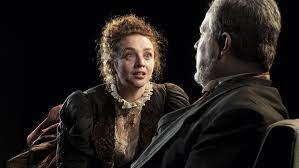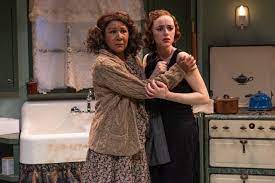FRIGID Fringe Festival 2023 (Part 5)
The 17th Annual FRIGID Fringe Festival is underway in New York City. This three week event is an open and uncensored downtown theater festival that gives artists an opportunity to let their ingenuity thrive in a venue that values freedom of expression and artistic determination. Many of this year’s performances are livestreamed so there are ample opportunities to see some Indie theater works and support the artists who develop and perform them.

TEST
Imagine going to a job interview at a prestigious corporation and you are asked about your sexual orientation. Whether or not you have friends. If you a prone to sweating. Elin Rahnev’s play TEST presents such a future state.
You might view this entire scenario as a far-fetched science fiction nightmare. You might presume it’s inevitable based on current trends. Either interpretation (or both) works in support of a well developed creepy tale of Big Brother at its slimiest.
This company prefers unmarried workers. If one’s wife complains about a broken refrigerator, the employee cannot focus on their work. Those predisposed to obesity could undermine the company’s prestige. Don’t like the questions in this interview? “You can simply get out of the chair and let someone else who is waiting eagerly outside to sit in it.” This new reality is vividly painted in sarcasm. “Do you know how many years it takes to sit in this divinely blessed chair?”
TEST is certainly cynical, perhaps a bit angry, wittily critical and astutely topical. Color coding the questions into segments did not seem additive but the kooky tone remained consistent. The accomplished performances delivered by Maria N. Angelova and Vitan Pravtchev were tightly constructed within the loosely staged framework. The production, directed by the author Mr. Rahnev, nicely showcased the absurdity while allowing the underlying horror to manifest itself.
All interviews come to an end and it was not clear whether this one would fizzle out despite its clever conceit. That did not happen. TEST ratcheted up the insanity with memorable plot twists and a welcome hint towards a larger story. Maybe that’s what the future holds.

Death of a Salesman: A New Play
Absurdist sarcasm does not begin to describe this bizarrely conceived and improbably winning riff on chasing the American dream. Referencing the masterwork by Arthur Miller, Death of a Salesman: A New Play updates the quaint door to door salesman from the middle of last century to the entrepreneurial culture of the present.
This version ridicules the high wired youthful get-rich-quick schemers of today in combination with the green movement. A Kickstarter campaign for Eco-ennis Tennis Balls raised one hundred thousand dollars. One year later the founder and his head of sales are still maniacally obsessed with driving their business model. Money has run out, however, and they are eating poorly, to say the least.
The hilariously delusional are the main targets here. Wacky entrepreneurial pitches can sound like brilliant notions when hyped properly. These caricatures know they are onto something big. When a player hits a tennis ball outside the fence there are ramifications. A raccoon might eat it and die. Players routinely hit a few outside each time they go on court. Eco-ennis tennis balls to the rescue!
Money is running out so a pivot is required. Nothing screams entrepreneurial genius like a well-timed pivot as the market responds negatively. Instead of saving animals, let’s message the best bouncing ball ever. Success is just around the corner! “Do you think we’ll miss the hustle when we’re rich?” is the suppositious question posed by these impoverished yet imagined captains of industry.
Playwright Austen Halpern-Graser adds a hallucination or two which abruptly turns this play from silly satire into macabre goofiness. Is the founder experiencing lunatic visions or a real life terrifying inspiration for the next pivot? No matter. It’s just business after all, where people “eat each other’s faces”. Important takeaway: “whoever swallows first, wins”.

Swinging on the Seine
D’yan Forest is 88. She puts that fact “out there right away in case I don’t make it through the show”. She has a certificate from Guinness World Records as the Oldest Working Female Comedian. Her coming of age is the framework. Her vagina and, more specifically, her clitoris is the focus.
“Tonight I’m going to talk and not do swinging,” she tells her amused audience, “unless that’s what you’re into”. Another punchline follows. “Bet you regret sitting in the front row.” This cabaret cum comedic sex drenched travelogue is good natured naughtiness. The audience laughed merrily with her.
The definition of swinging from the title is very clear from the outset. After divorcing a husband, Ms. Forest went to Paris. The journey is recalled as a “bumpy ride” quickly followed with “I did a lot of riding”. The show comes across as a confessional salon in your sprightly grandmother’s parlor starring the horniest version of Betty White imaginable.
Pearls of wisdom from someone who recruited Parisian men to give her ecstasies galore are shared. “Unlike conservative America the French didn’t need to fuck themselves” as “they were fucking each other”. Poetic turns include “He was male / He was French / He knew what to do on a riverside bench”.
In between lovers, instruments are played and songs are sung. Some rewrites are inevitable. The French classic Frere Jacques becomes “I’m a cougar”. Ms. Forest is certainly up-to-date sexually if you were wondering. “When in Paris” she lists “do unto him, do unto her, do unto they for all that matters”. This show is high energy, surreal, sweetly raunchy and likely extremely dangerous to the well-being of conservative prudes everywhere.
Performances at the Frigid Fringe Festival are running through March 5, 2023. Two dozen shows are performed multiple times at either the Kraine Theater or UNDER St Mark’s. Tickets can also be purchased for many shows via livestreaming as well.
www.frigid.nyc













You must be logged in to post a comment.